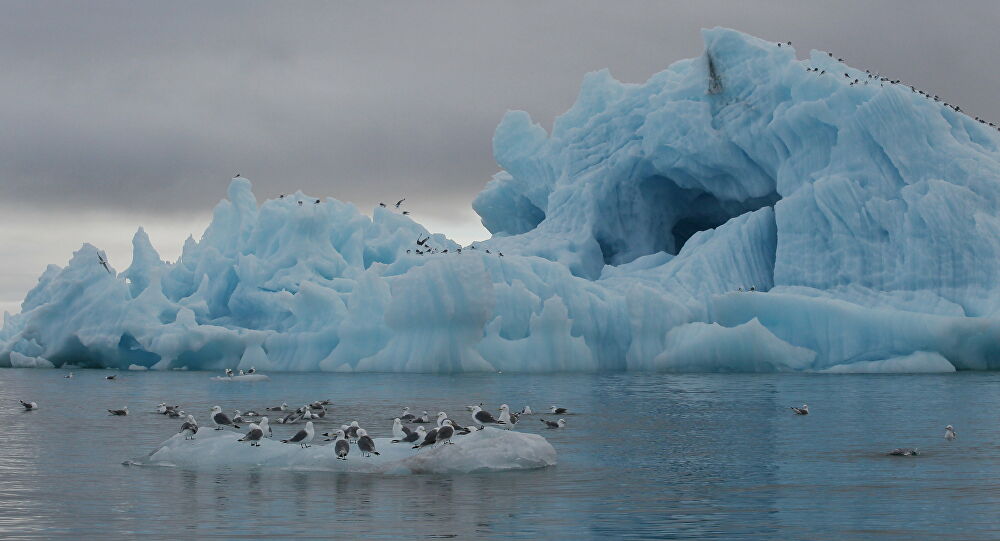The thickness of the pack ice is not the only thing that matters, though. Its topography is also important.
虽然浮冰块的厚度不是唯一重要的事情。其地形也很重要。
This is the province of Jennifer Hutchings of Oregon State University. She is using GDP buoys to track the motion of the ice around the ship.
这是俄勒冈州立大学Jennifer Hutchings的所在省份。她正在利用全球漂流浮标项目的信号浮标追踪船只周围冰层的运动。
Though sea ice is solid, it is not rigid. It forms but a thin skin on the ocean—
海冰虽然是固体,但并不坚固。它在海洋上形成了一层薄薄的层——
varying in depth from around 30cm in summer to a couple of metres in winter—so is readily moved by wind and current.
其深度从夏季的30厘米左右到冬季的几米不等——所以很容易随着风和洋流移动。
As the ice moves it stretches and cracks in some places.
随着冰层的移动,某些地方的冰层会伸展并裂开。
Large cracks formed in this way are called leads, because they are wide enough to "lead" a ship.
以这种方式形成的大裂缝被称为引线,因为它们的宽度足以引导船只。
In other places, by contrast, movement makes the ice thicker.
相比在其他地方,移动使冰层变得更厚。
As individual panes of ice butt up against each other, they create ridges that can be metres high.
当一块块冰相互碰撞时,就会形成高达几米的冰脊。
Dr Hutchings has not yet had a chance to process her data.
Hutchings博士还没有机会处理她的数据。

But even from the ship's deck she has been able to watch leads opening and ridges forming around the vessel.
但即使是在甲板上,她也能看到引线在船体周围的开口和隆起。
Her eyes and ears, as well as her instruments, tell her that this winter the ice has been particularly mobile—
她的眼睛和耳朵以及她的仪器都告诉她,这个冬天,冰的流动性特别大——
and has thus become particularly rough, with a surprising number of ridges.
因此变得特别粗糙,出现了数量惊人的冰脊。
These ridges may affect the rate at which the ice melts—but to complicate matters, this could happen in two opposing ways.
这些冰脊可能会影响冰融化的速度,但更复杂的是,这可能会以两种相反的方式发生。
Ridges make ice thicker, and thicker ice melts more slowly.
冰脊让冰层变得更薄,更厚的冰融化得更慢。
On the other hand, a ridge projects down into the sea as well as up into the air (Archimedes, again), so it may stir up water from below the surface.
另一方面,冰脊向下延伸到海里,也向上延伸到空中(又是阿基米德式的),所以它可能会从海面下激起海水。
Deep water is warmer than the surface layer, so this stirring would serve to increase melt rates.
深水比表层温度高,所以这种迹象会加快融化速度。
Moreover, to add to the confusion, ridges are prone to having pieces of ice fall off them into the sea, to form small blocks known as brash.
此外,更让人困惑的是,冰脊上的冰块容易掉落到海里,形成碎冰。
This brash, having more surface area per unit volume than unbroken ice, melts faster.
这种冰的单位体积表面积比完整的冰大,融化速度也快。
Dr Hutchings's main observation, though, is a change in the ice's structure.
虽然Hutchings博士观察的重点是冰层结构的变化。
Historically, this far north, where ice is always present in some form,
从历史上看,在冰层一直存在的遥远的北方,
winter is the time when it builds up as new layers are adding to existing floes, thickening them. In summer the ice then melts back a little.
冬天是冰层堆积的季节,因为新的冰层在原有的冰层上增加,使冰层变厚。到了夏天,冰就会融化一点。
But a core of the stuff remains from year to year and, over successive winters, more layers are added.
但物质中的核心年复一年被保存了下来,连续几个冬天后,更多冰层叠加在了一起。
That forges what is known as multi-year perennial ice.
由此形成了多年的终年冰。
译文由可可原创,仅供学习交流使用,未经许可请勿转载。



